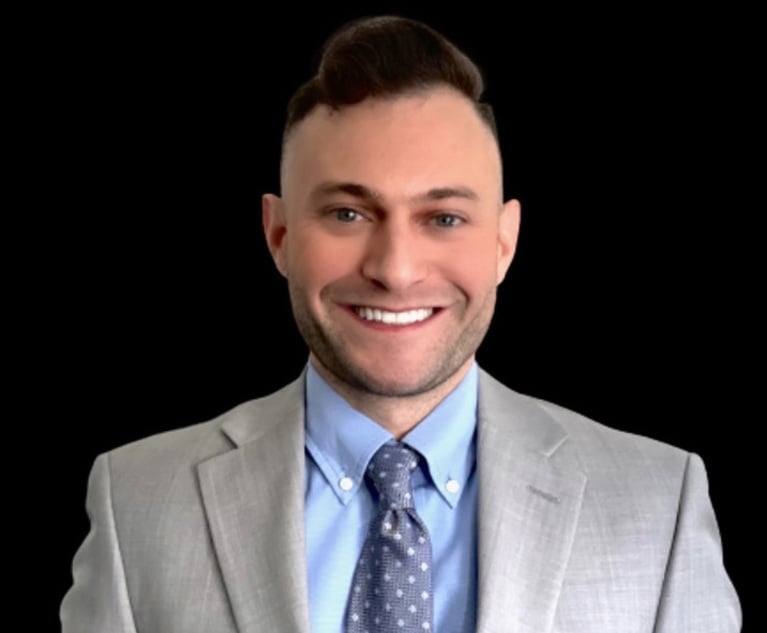Black Robes, Not White Coats: Conservative 9th Circuit Judges Call Out Court's Ruling on Inmate Sex-Reassignment Surgery
The U.S. Court of Appeals for the Ninth Circuit announced its decision denying an en banc rehearing of a case that affirmed a preliminary injunction requiring a prison to provide an incarcerated trans woman sex-reassignment surgery. The dissenting judges criticized the lower court's decision to mandate "an evolving standard of care."
February 10, 2020 at 10:22 PM
4 minute read
 United States Court of Appeal for the Ninth Circuit (Photo: Jason Doiy/ALM)
United States Court of Appeal for the Ninth Circuit (Photo: Jason Doiy/ALM)
The U.S. Court of Appeals for the Ninth Circuit on Monday announced that it will not rehear a case that affirmed a preliminary injunction requiring a prison to provide Adree Edmo, an incarcerated trans woman in Idaho, sex reassignment surgery. A group of dissenting judges on the court, however, criticized the lower court's decision to mandate "an evolving standard of care."
Ninth Circuit Judges M. Margaret McKeown and Ronald Gould and U.S. District Judge Robert Lasnik of the Western District of Washington, sitting by designation, denied the petitions for rehearing.
But Ninth Circuit Senior Judge Diarmuid O'Scannlain wrote that the decision made the Ninth Circuit "the first federal court of appeals to mandate that a State pay for and provide sex reassignment surgery to a prisoner under the Eighth Amendment."
O'Scannlain, who can no longer participate in en banc votes or formally join a dissent from denial to rehear en banc as a judge who recently took on senior status, still wrote an opinion in the matter, which was joined by Judges Consuelo Callahan, Carlos Bea, Sandra Ikuta, Ryan Nelson, Bridget Bade, Daniel Bress, Patrick Bumatay and Lawrence VanDyke, but not Judge Danielle Hunsaker, a former O'Scannlain clerk who assumed his seat last year. O'Scannlain called the panel's finding that an alternative treatment would be cruel and unusual punishment "as unjustified as it is unprecedented."
"The panel first, and fundamentally, errs by misunderstanding what it means for a chosen treatment to be medically 'unacceptable' for purposes of the Eighth Amendment," O'Scannlain wrote in the statement.
The judge took issue with the court's reliance on criteria for sex-reassignment surgery created by the World Professional Association for Transgender Health, an organization devoted to the treatment of the gender dysphoria, or distress around the mismatch between gender identity and biological sex, often experienced by trans men and women.
"A mere professional association simply cannot define what qualifies as constitutionally acceptable treatment of prisoners with gender dysphoria," he wrote, pointing to the fact that only about half of the committee members who agree on the criteria have medical degrees, with the rest made up of sexologists, psychotherapists, activists, sociologists and law professors.
Had the court recognized WPATH experts as "mere participants in an ongoing medical debate" they would have "acknowledged this case for what it is: a 'case of dueling experts,'" he wrote.
 Judge Diarmuid O'Scannlain of the U.S. Court of Appeals for the Ninth Circuit attending the Federalist Society's annual lawyers convention at the Mayflower Hotel in Washington on Nov. 14, 2019.
Judge Diarmuid O'Scannlain of the U.S. Court of Appeals for the Ninth Circuit attending the Federalist Society's annual lawyers convention at the Mayflower Hotel in Washington on Nov. 14, 2019.O'Scannlain also noted the panel's decision on the Eighth Amendment claims conflict with every other circuit that has encountered the issue.
"I do not know whether sex-reassignment surgery will ameliorate or exacerbate Adree Edmo's suffering. Fortunately, the Constitution does not ask federal judges to put on white coats and decide vexed questions of psychiatric medicine," he wrote. "The Eighth Amendment forbids the 'unnecessary and wanton infliction of pain,' not the "difference of opinion between a physician and the prisoner—or between medical professionals."
The departure from the traditional deliberate-indifference standard, which is used to help determine Eighth Amendment violations, comes during what the lower court called an "increased social awareness," the judge said.
"The temptation to stand at what we are told is society's next frontier and to invent a constitutional right to state-funded sex-reassignment surgery does not justify the revision of previously universal principles of Eighth Amendment jurisprudence," he said.
Dissenting from the denial of the petition to rehear the case en banc, Collins said the prison's decision to deny the surgery was not cruel and unusual punishment.
Collins also joined part of Bumatay's longer dissent, which argued that the decision waters down the deliberate-indifference standard.
Bumatay wrote that the panel's analysis allows future courts to infer deliberate indifference where they find "medically unacceptable" treatment, the second part of the test to determine cruel and unusual punishment, creating "one circular step" that dilutes deliberate indifference to mere negligence.
"By denying rehearing en banc in this case, we relegate federal judges to the role of referee in medical disputes," he wrote.
This content has been archived. It is available through our partners, LexisNexis® and Bloomberg Law.
To view this content, please continue to their sites.
Not a Lexis Subscriber?
Subscribe Now
Not a Bloomberg Law Subscriber?
Subscribe Now
NOT FOR REPRINT
© 2025 ALM Global, LLC, All Rights Reserved. Request academic re-use from www.copyright.com. All other uses, submit a request to [email protected]. For more information visit Asset & Logo Licensing.
You Might Like
View All

'Pull Back the Curtain': Ex-NFL Players Seek Discovery in Lawsuit Over League's Disability Plan

'Be Comfortable Being Uncomfortable': Pearls of Wisdom From 2024 GC Q&As

Trending Stories
- 1Was It Ever A Profession? A Look at the History of Law Firms as a Business with RJon Robins
- 2Antitrust Partner Plans Move to Davis Polk From Fried Frank
- 3How This Dark Horse Firm Became a Major Player in China
- 4Bar Commission Drops Case Against Paxton—But He Wants More
- 5Pardons and Acceptance: Take It or Leave It?
Who Got The Work
J. Brugh Lower of Gibbons has entered an appearance for industrial equipment supplier Devco Corporation in a pending trademark infringement lawsuit. The suit, accusing the defendant of selling knock-off Graco products, was filed Dec. 18 in New Jersey District Court by Rivkin Radler on behalf of Graco Inc. and Graco Minnesota. The case, assigned to U.S. District Judge Zahid N. Quraishi, is 3:24-cv-11294, Graco Inc. et al v. Devco Corporation.
Who Got The Work
Rebecca Maller-Stein and Kent A. Yalowitz of Arnold & Porter Kaye Scholer have entered their appearances for Hanaco Venture Capital and its executives, Lior Prosor and David Frankel, in a pending securities lawsuit. The action, filed on Dec. 24 in New York Southern District Court by Zell, Aron & Co. on behalf of Goldeneye Advisors, accuses the defendants of negligently and fraudulently managing the plaintiff's $1 million investment. The case, assigned to U.S. District Judge Vernon S. Broderick, is 1:24-cv-09918, Goldeneye Advisors, LLC v. Hanaco Venture Capital, Ltd. et al.
Who Got The Work
Attorneys from A&O Shearman has stepped in as defense counsel for Toronto-Dominion Bank and other defendants in a pending securities class action. The suit, filed Dec. 11 in New York Southern District Court by Bleichmar Fonti & Auld, accuses the defendants of concealing the bank's 'pervasive' deficiencies in regards to its compliance with the Bank Secrecy Act and the quality of its anti-money laundering controls. The case, assigned to U.S. District Judge Arun Subramanian, is 1:24-cv-09445, Gonzalez v. The Toronto-Dominion Bank et al.
Who Got The Work
Crown Castle International, a Pennsylvania company providing shared communications infrastructure, has turned to Luke D. Wolf of Gordon Rees Scully Mansukhani to fend off a pending breach-of-contract lawsuit. The court action, filed Nov. 25 in Michigan Eastern District Court by Hooper Hathaway PC on behalf of The Town Residences LLC, accuses Crown Castle of failing to transfer approximately $30,000 in utility payments from T-Mobile in breach of a roof-top lease and assignment agreement. The case, assigned to U.S. District Judge Susan K. Declercq, is 2:24-cv-13131, The Town Residences LLC v. T-Mobile US, Inc. et al.
Who Got The Work
Wilfred P. Coronato and Daniel M. Schwartz of McCarter & English have stepped in as defense counsel to Electrolux Home Products Inc. in a pending product liability lawsuit. The court action, filed Nov. 26 in New York Eastern District Court by Poulos Lopiccolo PC and Nagel Rice LLP on behalf of David Stern, alleges that the defendant's refrigerators’ drawers and shelving repeatedly break and fall apart within months after purchase. The case, assigned to U.S. District Judge Joan M. Azrack, is 2:24-cv-08204, Stern v. Electrolux Home Products, Inc.
Featured Firms
Law Offices of Gary Martin Hays & Associates, P.C.
(470) 294-1674
Law Offices of Mark E. Salomone
(857) 444-6468
Smith & Hassler
(713) 739-1250






